| Listing 1 - 10 of 148 | << page >> |
Sort by
|
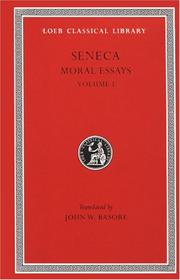
ISBN: 0674992369 0674992806 0674993438 Year: 1985 Publisher: Cambridge (Mass.): Harvard university
Abstract | Keywords | Export | Availability | Bookmark
 Loading...
Loading...Choose an application
- Reference Manager
- EndNote
- RefWorks (Direct export to RefWorks)
Seneca, Lucius Annaeus, born at Corduba (Cordova) ca. 4 BCE, of a prominent and wealthy family, spent an ailing childhood and youth at Rome in an aunt's care. He became famous in rhetoric, philosophy, money-making, and imperial service. After some disgrace during Claudius's reign he became tutor and then, in 54 CE, advising minister to Nero, some of whose worst misdeeds he did not prevent. Involved (innocently?) in a conspiracy, he killed himself by order in 65. Wealthy, he preached indifference to wealth; evader of pain and death, he preached scorn of both; and there were other contrasts between practice and principle. We have Seneca's philosophical or moral essays (ten of them traditionally called Dialogues)-on providence, steadfastness, the happy life, anger, leisure, tranquility, the brevity of life, gift-giving, forgiveness-and treatises on natural phenomena. Also extant are 124 epistles, in which he writes in a relaxed style about moral and ethical questions, relating them to personal experiences; a skit on the official deification of Claudius, Apocolocyntosis (in Loeb Classical Library no. 15); and nine rhetorical tragedies on ancient Greek themes. Many epistles and all his speeches are lost.
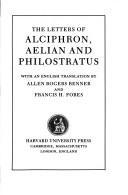
ISBN: 0674994213 9780674994218 Year: 2014 Publisher: Cambridge, MA : Harvard University Press,
Abstract | Keywords | Export | Availability | Bookmark
 Loading...
Loading...Choose an application
- Reference Manager
- EndNote
- RefWorks (Direct export to RefWorks)
The fictitious, highly literary Letters of Alciphron (second century CE) are mostly to invented characters. Letters of Farmers by Aelian (c. 170-235 CE) portray the country ways of their imagined writers. The Erotic Epistles of Philostratus (perhaps born c. 170 CE) resemble and may have been influenced by those of Alciphron.
Languages & Literatures --- Greek & Latin Languages & Literatures --- Greek letters. --- Greek letters --- Greek literature
Book
ISBN: 9053561382 9053561153 Year: 1998 Publisher: Amsterdam Amsterdam University Press
Abstract | Keywords | Export | Availability | Bookmark
 Loading...
Loading...Choose an application
- Reference Manager
- EndNote
- RefWorks (Direct export to RefWorks)
Latin language --- -Classical languages --- Italic languages and dialects --- Classical philology --- Latin philology --- Dictionaries --- -Dutch --- Latijn: woordenboek --- Dutch. --- Dutch language --- Classical Latin language --- Classical languages --- Dictionaries&delete& --- Dutch
Book
ISBN: 2702302122 9782702302125 Year: 1974 Publisher: Lyon Chalet
Abstract | Keywords | Export | Availability | Bookmark
 Loading...
Loading...Choose an application
- Reference Manager
- EndNote
- RefWorks (Direct export to RefWorks)
Salvation --- Language and languages --- Religious aspects --- Christianity --- -Salvation --- Religion --- Foreign languages --- Languages --- Anthropology --- Communication --- Ethnology --- Information theory --- Meaning (Psychology) --- Philology --- Linguistics --- -Christianity --- Religious aspects&delete& --- Christianity and language --- Language and languages - Religious aspects - Christianity
Book
ISBN: 9030401060 Year: 1976 Publisher: Deurne Hilversum Unieboek Gooi en Sticht
Abstract | Keywords | Export | Availability | Bookmark
 Loading...
Loading...Choose an application
- Reference Manager
- EndNote
- RefWorks (Direct export to RefWorks)
Christianity --- God (Christianity) --- Language and languages --- Religion --- Philosophy --- Religious aspects
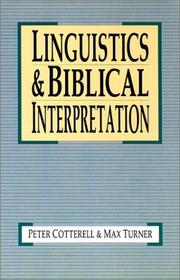
ISBN: 0830817514 Year: 1989 Publisher: Downers Grove InterVarsity press
Abstract | Keywords | Export | Availability | Bookmark
 Loading...
Loading...Choose an application
- Reference Manager
- EndNote
- RefWorks (Direct export to RefWorks)
Language and languages --- Linguistics --- Religious aspects --- Christianity --- Biblia --- Hermeneutics.
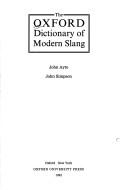
ISBN: 0198661819 9780198661818 Year: 1992 Publisher: Oxford Oxford university press
Abstract | Keywords | Export | Availability | Bookmark
 Loading...
Loading...Choose an application
- Reference Manager
- EndNote
- RefWorks (Direct export to RefWorks)
English language --- Anglais (Langue) --- Slang --- Dictionaries --- Argot --- Dictionnaires --- Dictionaries. --- -Germanic languages --- -Dictionaries --- -Slang --- Germanic languages --- English language - Slang - Dictionaries
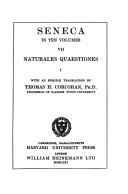
ISBN: 0674994957 0674995031 0434994502 043499457X 9780674994959 9780434994502 9780434994571 Year: 1971 Volume: 450 Publisher: [Place of publication not identified] Harvard University Press
Abstract | Keywords | Export | Availability | Bookmark
 Loading...
Loading...Choose an application
- Reference Manager
- EndNote
- RefWorks (Direct export to RefWorks)
Annotation
Sciences antiques --- Greek & Latin Languages & Literatures --- Languages & Literatures --- Sciences antiques. --- Philosophy of Nature --- Classical Literature --- Science, Ancient.
Book
ISBN: 2851310232 9782851310231 Year: 1980 Publisher: Paris Le soleil noir
Abstract | Keywords | Export | Availability | Bookmark
 Loading...
Loading...Choose an application
- Reference Manager
- EndNote
- RefWorks (Direct export to RefWorks)
Tantrism --- Word (Linguistics) --- Language and languages --- Religious aspects --- Hinduism --- Language and languages - Religious aspects - Hinduism --- Indian religions --- India
Book
ISBN: 9789004282704 900428270X 9789004282711 9004282718 1322200319 Year: 2015 Volume: 42 Publisher: Leiden, Netherlands : Brill,
Abstract | Keywords | Export | Availability | Bookmark
 Loading...
Loading...Choose an application
- Reference Manager
- EndNote
- RefWorks (Direct export to RefWorks)
The Gender Challenge of Hebrew is the first book to delve in depth into the problem of gender representation over the 3,000-year history of the Hebrew language. By analyzing and illustrating the grammatical characteristics of gender in Biblical, Mishnaic, Medieval and Modern Hebrew, Malka Muchnik reveals the social and cultural issues that they reflect. Gender discrimination in all periods of Hebrew is shown in sacred, liturgical and literary texts, as well as in the popular language spoken today. All of them testify to the problematic status of women, who were traditionally excluded from religious studies and public activities, and in recent decades have been struggling to change this practice. Malka Muchnik shows that linguistic change remains a challenging goal.
22.02*1 --- Bijbelse filologie: hebreeuws --- 22.02*1 Bijbelse filologie: hebreeuws --- Hebrew language --- Gender. --- Sex differences. --- Jewish language --- Jews --- Semitic languages, Northwest --- Languages
| Listing 1 - 10 of 148 | << page >> |
Sort by
|

 Search
Search Feedback
Feedback About
About Help
Help News
News